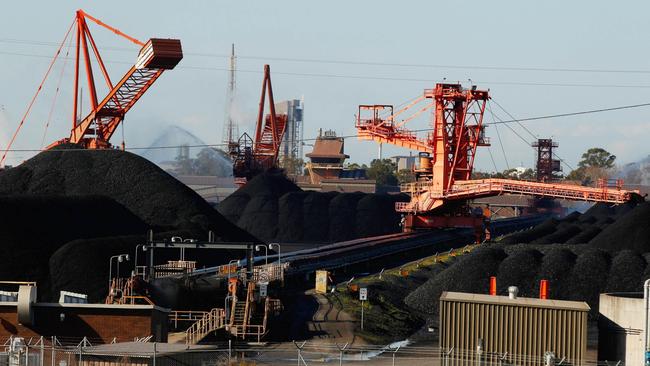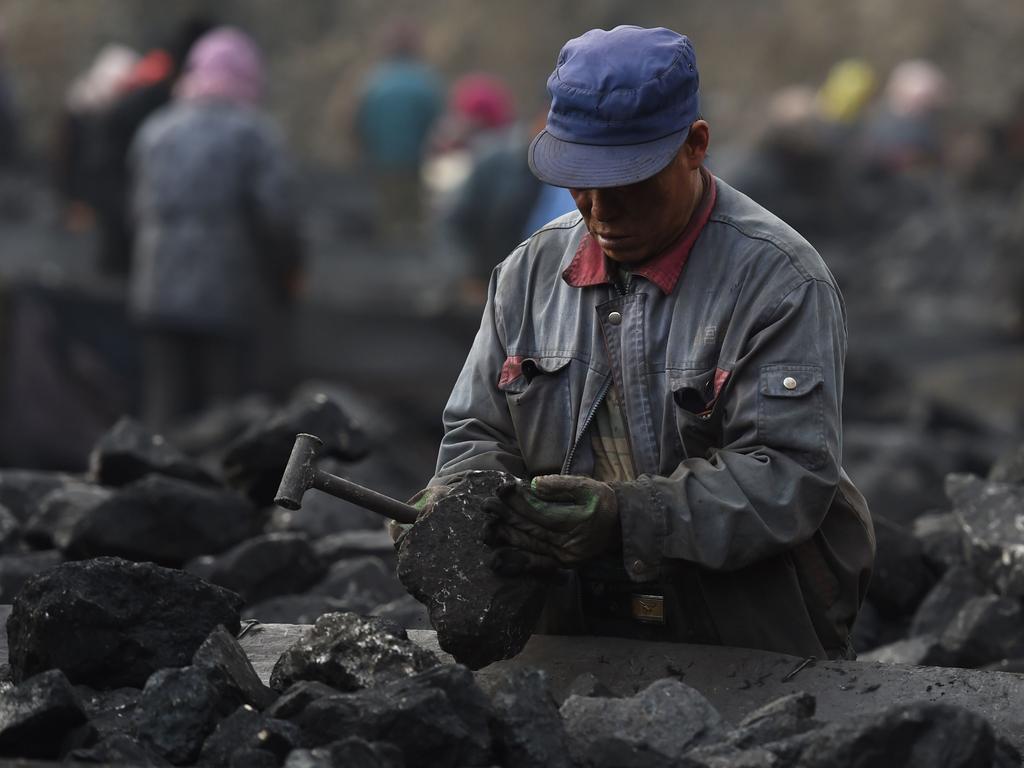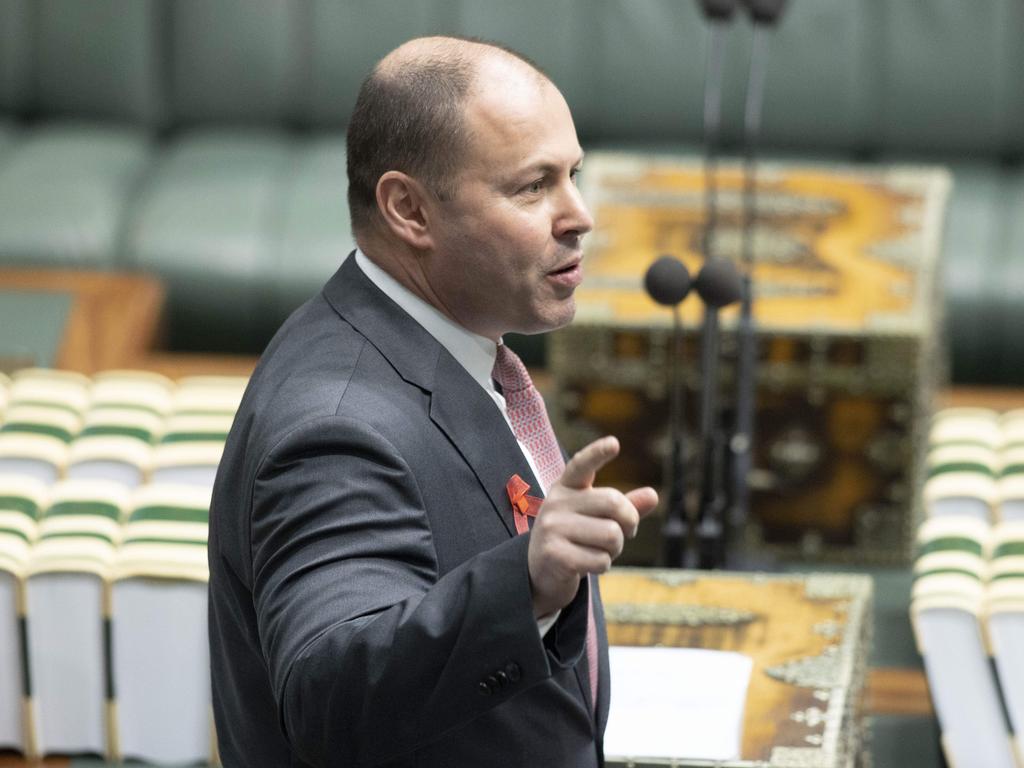China leaves 50 coal ships stranded
Canberra is working to shift $700m of Aussie coal stuck off Chinese ports but Scott Morrison says the issue is incredibly complicated.

The Australian government is working through issues with the Chinese government after it was revealed $700 million worth of coal is stuck on more than 50 ships off Chinese ports, Scott Morrison says.
The plight of the ships deepens a crisis for one of the nation’s most valuable export earners and damaging delicate trade tensions with Australia’s largest trade partner.
Some 53 ships containing 5.7 million tonnes of Australian coal have been waiting for a month or more to unload their coal to Chinese customers at the northern ports of Jingtang and Caofeidian, according to shipping data analysed by Bloomberg.
It estimates up to 1000 people are stranded on the vessels awaiting clearance with 66 Australian coal ships overall currently in Chinese waters.
The bulk vessels are the latest conscripts in China’s sweeping campaign of trade warfare against Australia, with authorities overseeing a go-slow on Australian coal to support more expensive local producers.
“I have made it clear that Australia makes decisions about our policies and our national interests and no one elses … we will work through these issues with respect with the Chinese government,” The Prime Minister told Nine’s The Today Show.
“There are obviously tensions there but those tensions aren’t resolved by Australia surrendering its sovereignty,” he said.
Mr Morrison said he would work through the “process” to help an estimated 1000 people who are stranded on the ships.
“It is incredibly complicated what we are dealing with here and we have the best people working on these issues,” he said.
“In the same way, we have amazing consular people who have been working on the case of Dr Moore-Gilbert.”
Mr Morrison said he was “very clear” that he wanted to achieve a “happy coexistence and positive relationship” with China.
“They are our single largest trading partner,” he said.
“We deal with very complicated and difficult issues, which this is one of, and we are very keen to ensure we get the best outcome for Australia and in the interests of our relationship.”
The revelation that more than triple the 21 ships previously known to be idling off the Chinese coast are now stranded may inflame a diplomatic stoush between Canberra and Xi Jinping’s administration which appears to be punishing one of Australia’s biggest exports at the expense of its own steel making industry.
China’s Foreign Ministry attributed the delays to environmental checks.
“In recent years, Chinese customs have conducted risk monitoring and assessment on the safety and quality of imported coal. We found that there were many cases where imported coal failed to meet environmental standards,” Foreign Ministry spokesman Zhao Lijian said on Wednesday when asked about the stranded ships, according to Bloomberg.
“China has strengthened examination and testing over imported coal for safety, quality and environment standards so as to better protect the legitimate interests of Chinese companies as well as environmental safety.”
One of the vessels is an Indian-flagged vessel packed with Australian coal which has been prevented from leaving Chinese waters, even after Japan offered to accept the ship’s cargo to end the five-month standoff.
The bulk carrier has been turned into a “floating prison” for its 23 Indian crew, according to the National Union of Seafarers of India.
“China’s recent informal ban on Australian coal imports is reportedly preventing a handful of Capes (ships) from discharging, but stricter COVID-19 testing is also slowing down the turnaround of ships in some ports,” shipbroking expert Braemar said on Wednesday.
Beijing had earlier acknowledged Mr Morrison’s “positive comments” about China in a sign the seven-month diplomatic spat with Australia’s biggest trading partner may be cooling. “China noticed Prime Minister Morrison’s positive comments on the global influence of China’s economic growth and China’s poverty alleviation efforts,” Mr Zhao said on Tuesday evening in Beijing.
“We hope Australia will make independent, objective, sensible choices that serve its own interests,” the Foreign Ministry spokesperson said at a daily press conference.
Those comments were a notable change from the bombastic tone China’s Foreign Ministry has used about the Morrison government since April when it enraged Xi Jinping’s administration by Australia’s championing of an inquiry into the origins of the coronavirus.
Victorian timber had been added earlier in November to a list of industries banned by China, which includes wine, barley, beef, wheat, lobsters, cotton, with sugar and copper cited by state media as the next targets in the extraordinary campaign by Australia’s biggest customer.
The fallout has also extended into Australia’s gas industry after Woodside Petroleum revealed Chinese buyers axed a potential deal to buy a stake in its $16bn Scarborough gas project amid trade tensions.
China’s domestic coal producers have come under huge pressure as the commodity’s price has fallen.
State-owned Yongcheng Coal defaulted on a payment for a AAA-rated $US152.2bn bond earlier this month.
That shocked many investors, who have long considered China’s state-backed firms to be immune from credit defaults.
Reports of Yoncheng’s distress saw fellow Chinese domestic coal companies Jinneng Group and Shanxi Coal Import & Export Group cancel new bond sales.
Creditors on Tuesday agreed to extend Yongcheng’s repayment on its debt for 270 days.




